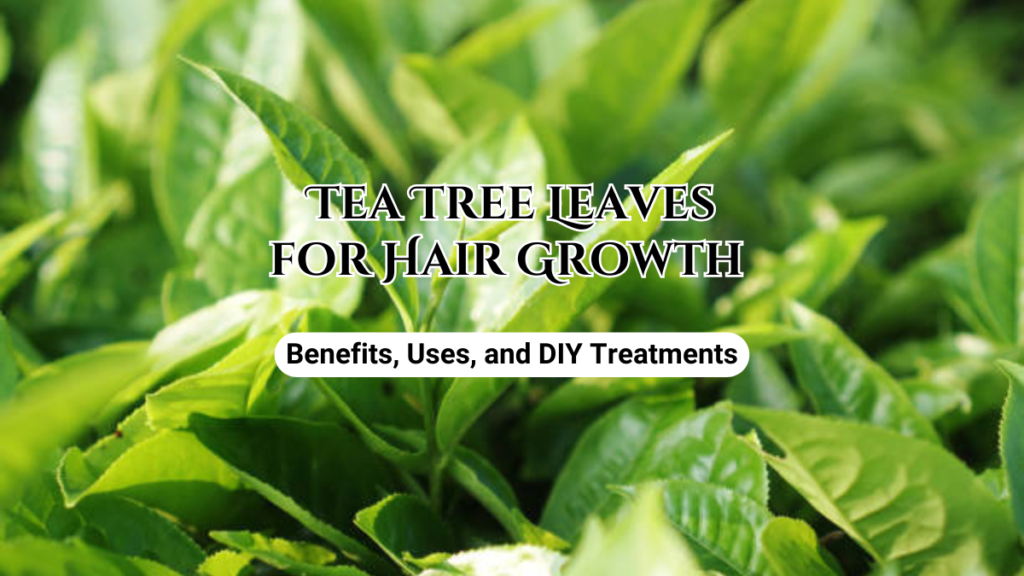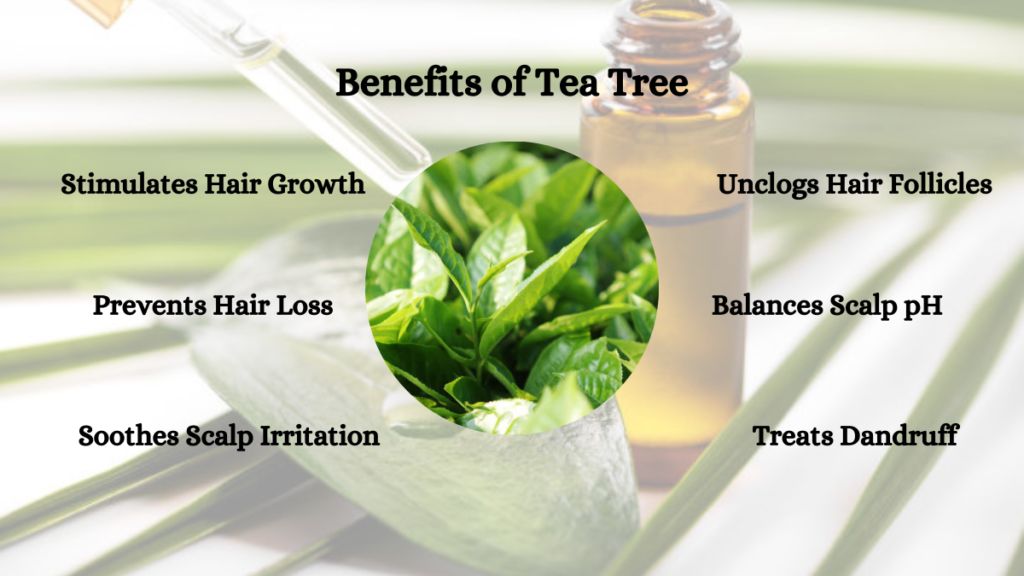
Tea tree leaves, derived from the Melaleuca alternifolia plant native to Australia, have long been revered for their potent medicinal properties. Among their many benefits, tea tree leaves are especially notable for promoting hair health. This article will delve into the benefits of tea tree leaves for hair growth, explain why tea tree is good for hair, discuss what tea tree does for hair, and provide practical ways to use tea tree for hair growth.
Table of Contents
Understanding Tea Tree Leaves
Tea tree leaves are rich in essential oils that possess powerful antimicrobial, antifungal, and anti-inflammatory properties. These properties make them highly effective in treating various skin and hair conditions. The primary component of tea tree leaves, terpinen-4-ol, is known for its ability to fight bacteria and fungi, making it a versatile natural remedy.
Benefits of Tea Tree Leaves for Hair Growth

1. Stimulates Hair Growth
Tea tree leaves help to stimulate blood flow to the scalp, which is essential for healthy hair growth. Enhanced circulation ensures that hair follicles receive the necessary nutrients and oxygen to thrive. This stimulation can lead to thicker, stronger hair.
2. Unclogs Hair Follicles
Clogged hair follicles can hinder hair growth and lead to thinning hair. Tea tree leaves effectively cleanse the scalp, removing excess oil, dirt, and dead skin cells that can block hair follicles. This cleansing action allows hair to grow more freely and prevents hair thinning.
3. Prevents Hair Loss
Hair loss can result from various scalp conditions, including dandruff, seborrheic dermatitis, and fungal infections. The antimicrobial properties of tea tree leaves help to combat these conditions, thereby reducing hair loss. Regular use of tea tree can maintain a healthy scalp, preventing issues that lead to hair fall.
4. Balances Scalp pH
A balanced scalp pH is crucial for optimal hair health. Tea tree leaves help to maintain the scalp’s natural pH level, creating a conducive environment for hair growth. An imbalanced pH can lead to dryness, irritation, and hair thinning.
5. Soothes Scalp Irritation
Scalp irritation can result from environmental factors, harsh hair products, and underlying skin conditions. Tea tree leaves possess anti-inflammatory properties that soothe and calm the scalp, reducing redness and irritation.
6. Treats Dandruff
Dandruff is a common scalp condition that can impede hair growth and cause discomfort. The antifungal properties of tea tree leaves help to combat the yeast-like fungus that causes dandruff. By soothing the scalp and reducing flaking, tea tree promotes a healthier scalp environment.
Why Tea Tree is Good for Hair
1. Antimicrobial Properties
The antimicrobial properties of tea tree leaves make them highly effective in treating scalp infections. These properties help to keep the scalp clean and free from bacteria and fungi that can cause various scalp issues.
2. Anti-Inflammatory Effects
Tea tree leaves have strong anti-inflammatory effects that help to reduce scalp inflammation. This is particularly beneficial for individuals with sensitive or irritated scalps, as it helps to calm and soothe the skin.
3. Natural Cleansing Agent
Tea tree leaves act as a natural cleansing agent, removing impurities from the scalp and hair. This helps to maintain a clean and healthy scalp, which is essential for healthy hair growth.
4. Moisturizing Benefits
Tea tree leaves have moisturizing properties that help to hydrate the scalp and hair. This can prevent dryness and flakiness, ensuring that the scalp remains healthy and the hair stays nourished and vibrant.
What Tea Tree Does for Hair
1. Promotes Hair Growth
Tea tree leaves promote hair growth by stimulating the scalp and improving blood circulation. This ensures that hair follicles receive the necessary nutrients and oxygen to grow.
2. Prevents Scalp Infections
The antimicrobial properties of tea tree leaves help to prevent and treat scalp infections. This keeps the scalp healthy and free from conditions that can hinder hair growth.
3. Reduces Dandruff
Tea tree leaves effectively combat dandruff by targeting the fungus that causes it. Regular use of tea tree can reduce flaking and itching, promoting a healthier scalp environment.
4. Enhances Hair Shine
By maintaining a healthy scalp and nourishing the hair, tea tree leaves can enhance the overall appearance of your hair. This results in hair that is strong, shiny, and vibrant.
How to Use Tea Tree for Hair Growth
1. Tea Tree Shampoo
Using a tea tree shampoo is one of the easiest ways to incorporate tea tree into your hair care routine. These shampoos combine the cleansing properties of shampoo with the therapeutic benefits of tea tree.
DIY Tea Tree Shampoo:
- Add 10-15 drops of tea tree oil to your regular shampoo bottle.
- Mix the tea tree oil with the shampoo.
- Use this mixture to wash your hair as you normally would, ensuring you massage it into your scalp.
2. Scalp Treatment
A direct scalp treatment with tea tree can be highly effective for promoting hair growth and treating scalp conditions.
DIY Tea Tree Scalp Treatment:
- Mix 4-5 drops of tea tree oil with 2 tablespoons of a carrier oil (such as coconut oil, Almond oil, or olive oil).
- Apply the mixture to your scalp.
- Gently massage the mixture into your scalp for 5-10 minutes.
- Leave it on for 2 hours or more or overnight for better results.
- Rinse thoroughly and shampoo as usual.
3. Tea Tree Hair Mask
A hair mask infused with tea tree oil can provide deep conditioning and rejuvenation for your hair and scalp.
DIY Tea Tree Hair Mask:
- Combine 1 tablespoon of your regular carrier oil (like coconut oil or almond oil), 1 tablespoon of honey, and 5-7 drops of tea tree oil in a bowl and mix it well.
- Apply the mask to your hair and scalp evenly.
- Leave the mask on for 35-60 minutes.
- Rinse thoroughly and shampoo as usual.
4. Tea Tree Spray
A tea tree spray can be a convenient way to reap the benefits of tea tree throughout the day.
DIY Tea Tree Spray:
- Fill a spray bottle with water.
- Add 10-15 drops of tea tree essential oil to the bottle.
- Shake well to mix the ingredients.
- Spray the mixture onto your scalp and hair, focusing on problem areas.
5. Tea Tree Conditioner
You can enhance your regular conditioner by adding tea tree to it.
DIY Tea Tree Conditioner:
- Add 15-20 drops of tea tree oil to your regular conditioner bottle.
- Shake well to mix the tea tree oil with the conditioner.
- Use this mixture after shampooing, applying it to your hair and scalp.
- Leave it for a one minute atleast and rinse it off thoroughly.
Safety Precautions and Tips
While tea tree leaves offer numerous benefits, it’s essential to use them correctly to avoid potential side effects. There are some safety precautions and tips:
1. Patch Test: Before using tea tree on your scalp or hair, perform a patch test to ensure you do not have an allergic reaction. Apply a small amount of the tea tree mixture to your inner arm and wait for 24 hours. If you experience any redness, itching, or irritation, do not use tea tree on your scalp.
2. Dilute Properly: Tea tree essential oil is potent and should be diluted properly before use. Mixing it with a carrier oil helps to reduce the risk of skin irritation.
3. Avoid Contact with Eyes: Be careful to avoid getting tea tree oil in your eyes, as it can cause irritation. If it get into your eyes by any chance, rinse your eyes thoroughly with fresh tap water.
4. Use Consistently: For best results, use tea tree consistently as part of your hair care routine. Regular use can help to maintain a healthy scalp and promote hair growth.
5. Consult a Professional: If you have any underlying scalp conditions or are unsure about using tea tree, consult a dermatologist or healthcare professional for advice.
FAQs
How to use tea tree oil for hair growth overnight?
To use Tea Tree oil overnight for hair growth, you must mix 10-15 drops of it with your carrier oil like coconut or almond oil and massage it on your hair and leave it overnight. Rinse it off next morning.
What oil is best for hair growth?
Ther are so many oils which are best for hair. but for hair growth, Rosemary oil is really the best for hair growth.
How do you use tea tree hair and scalp treatment?
A direct scalp treatment with tea tree can effectively promote hair growth and treat scalp conditions. Mix 3-5 drops of tea tree with 2 tablespoons of a carrier oil. Apply to the scalp, massage for 5-10 minutes, leave for 30 minutes or overnight, then rinse and shampoo.
How often should I use tea tree shampoo?
Tea Tree Shampoo can be used often or whenever your hair needs it but using any shampoo daily can led to dry scalp and hair. So, avoid using any shampoo on daily basis.
Is it better to put tea tree oil in shampoo or conditioner?
Yes, it is better to use Tea Tree Oil in shampoo or conditioner. You can add 3-4 drops of tea tree oil to your shampoo or conditioner.
Is it OK to put tea tree oil in your hair everyday?
It’s okay to use Tea Tree Oil in your hair everyday but mix it with your regular or carrier oil ,then massage it in your hair. Make sure to Rinse it off the next day.
Conclusion
Tea tree leaves are a powerful natural remedy for promoting hair growth and maintaining a healthy scalp. Their antimicrobial, anti-inflammatory, and moisturizing properties make them an excellent addition to any hair care routine. By incorporating tea tree into your shampoo, scalp treatments, hair masks, and conditioners, you can enjoy the numerous benefits that tea tree leaves offer for hair health.
Whether you’re looking to stimulate hair growth, combat dandruff, or enhance the overall appearance of your hair, tea tree leaves provide a natural and effective solution. Remember to use them correctly and consistently to achieve the best results, and enjoy the journey to healthier, stronger, and more vibrant hair.
Disclaimer: The information provided in this article is for educational and informational purposes only. Always consult with a qualified healthcare provider before using any herbal remedies, essential oils, or supplements
Read more:
Top 5 Incredible benefits of Rosemary Essential Oil

As a dedicated freelance blog writer for a medicinal garden plants , I am passionate about exploring and sharing the healing power of nature. I am based in India, and my main focus is to provide valuable insights into the cultivation and use of medicinal plants, aiming to inspire sustainable and healthful living.
